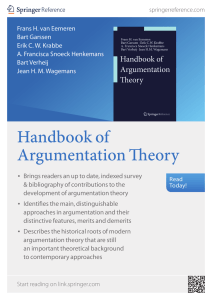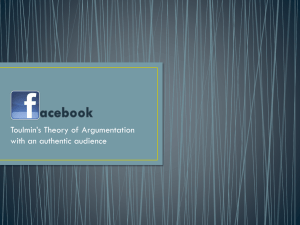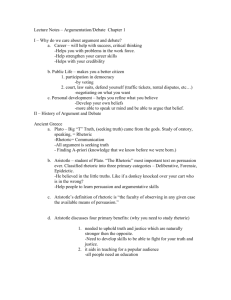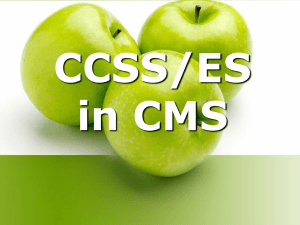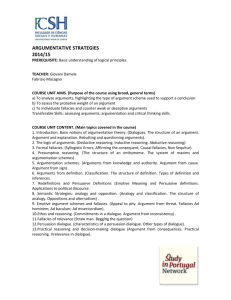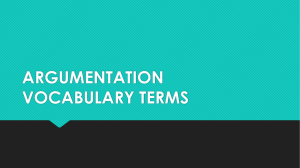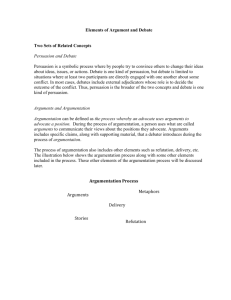Words - University of Southern California
advertisement
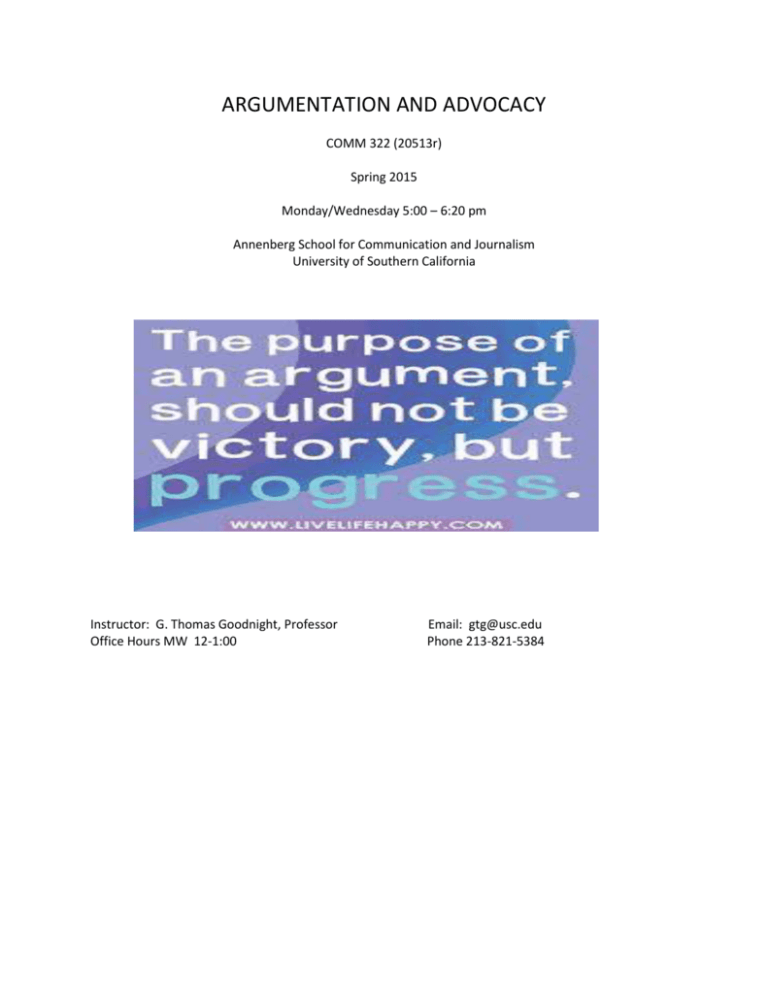
ARGUMENTATION AND ADVOCACY COMM 322 (20513r) Spring 2015 Monday/Wednesday 5:00 – 6:20 pm Annenberg School for Communication and Journalism University of Southern California Instructor: G. Thomas Goodnight, Professor Office Hours MW 12-1:00 Email: gtg@usc.edu Phone 213-821-5384 ARGUMENTATION AND ADVOCACY The movement to study argumentation crosses disciplines and continents. In this course, you will be introduced to the study of critical thinking and the practices of advocacy. This will be accomplished in three ways. First, we will work through the development and uses of communicative reasoning and advocacy. The materials of the course are set up so that you are able to sharpen perceptions of what sorts of argument are appropriate, carry weight, and can be made in given situations. Second, we work to understand the psychological process of reasoning in contingent situations where there is a choice among means and commitments in relation to anticipated outcomes. Third, we investigate particular fields of argumentation in order how a field itself becomes defined by different means and ends of critical communication. There are two examinations: an in class mid-term and a final take-home examination. Each counts 30% toward the final grade. In addition, the student may choose among three options (30%). First, students may do a study of a contemporary controversy where disputes have a history, are presently polarized, and advocates are trying to move the issues in a favorable direction. Specifics on the term paper will be discussed early in the semester. Second, a student may work with a local grade school in a project that works with student leadership groups to form a charity campaign, Penny Harvest. Students are expected to travel to UPC or Health Science local schools and help students discover local advocacy resources, deliberate on the usefulness of money, and conduct campaigns. Schedules and directions provided early in the semester. 10% of the grade will rest on participation, which includes a short assignment to find examples of key items discussed in class. These will be assigned well in advance, but every student should make a short public presentation on a single argument concept, at least once. The course will feature lectures. Please read the chapters in the book and pay attention to examples. The course will be most effective if you use it to cultivate a habit of mind, a way of thinking, that will permit you to contribute in a sophisticated, ethical, and powerful way in public, professional, and personal engagements of thinking, conversation, discussion and debate. Required Texts: Thomas A. Hollihan and Kevin T. Baaske, Arguments & Arguing, Waveland 2015. Daniel Kahneman, Thinking Fast and Slow, Farrar, Straus, & Giroux, 2001. The books are at the Book Store. There are articles assigned that can be obtained through the University of Southern California library. Note that as the instructor I subscribe to the policies of the University of Southern California in relation to student integrity and completion. TENTATIVE SYLLABUS M January 11 Introduction to the Course Read: Hollihan & Baaske, Chapter 1. Argumentation as Human Symbolic Activity. W January 13 The Spheres of Argument Read: G. Thomas Goodnight, The Spheres of Argument: A Speculative Inquiry into the Arts of Public Deliberation,” Argumentation and Advocacy 48 (2012), 198-210. M January 18 No Class W January 20 Good Reasons, Narrative Logics, and Contingency Read : Hollihan & Baaske, Chapter 2. The Foundations of Argument, 19-36. Walter Fisher, “Toward a Logic of Good Reasons,” Quarterly Journal of Speech, 1978, 376-384. Karl Wallace, “The Substance of Rhetoric: Good Reasons,” Quarterly Journal of Speech, 1963, 239-249. M January 25 Adjusting to the Audience Read: Hollihan & Baaske, Chapter 3. Audiences & Fields of Argument W January 27 Type I and Type II Thinking Read: Kahneman, Part I Two Systems Irving Cope, Definition, Introduction to Logic M February 1 Thinking on the Bias Read: Kahneman, Part II Heuristics and Biases William James, On a Certain Blindness in Human Beings http://www.uky.edu/~eushe2/Pajares/jcertain.html W February 3 Propositions and Stasis Read: Hollihan & Baaske, Chapter 5. Argumentation & Critical Thinking Wayne Thompson, “Stasis in Aristotle’s Rhetoric,” Quarterly Journal of Speech 48 (1972): 134-142. M February 7 The Logic of Argument: Induction and Deduction Read: Hollihan and Baaske, Chapter 6, pp. 97-108. W February 9 Practical Reasoning: The Toulmin Model of Argument Read: Hollihan and Baaske, Chapter 6, pp. 109-114. Ehninger and Brockriede, Chapter 4 A Unit of Proof BB Theodore Prosise and Greg R. Miller, “Argument Fields as Arenas of Discursive Struggle, Argumentation & Advocacy 32 (1996): 111-120. M February 14 Proof is in the Pudding Read: Hollihan and Baaske, Chapter 7. The Grounds for Argument. W February 16 Words of Contestation, Dissensus, and Antagonism Read: Hollihan & Baaske, Chapter 4. The Language of Argument. M February 21 Research, Discovery, Invention & Arrangement Read: Hollihan & Baaske, Chapter 8. Building Arguments Cap: Analyzing the Proposition, BB W February 23 The Fallacies of Informal Reasoning Read: Irving Cope, “Informal Fallacies,” Introduction to Logic, 97-120. M February 29 MID-TERM EXAMINATION W Mrc 7 Seeing the Argument Read: Hollihan & Baaske, Chapter 10 Visual Argument Figures of Rhetoric in Advertising Language Edward F. McQuarrie and David Glen Mick Journal of Consumer Research, Vol. 22, No. 4 (Mar., 1996), pp. 424-438 M March 9 Judgments of Confidence, Trust and Risk Read: Kahneman, Part III, Overconfidence M March 21 Aruging Events, Frames, and Reality Read: Kahneman, Part IV Choices W March 23 Public Argument and Public Culture Read: Hollihan & Baaske, Chapter 13 , Argumentation in Politics M March 28 Forensic Argument & Questions of Justice Read: Hollihan & Baaske, Chapter 14, Argumentation and the Law M April 4 Argument and Ecology Read: J. Robert Cox, The Irreperable James F. Klumpp, “Argumentative Ecology,” Argumentation and Advocacy 45 (2009): 193-197. Jessica Prody, “A Call for Polycultural Arguments: Critiquing the Monoculture Rhetoric of the Local Food Movement, Argumentation and Advocacy 50 (2013): 104-119. Lynn M. Stearney, “Feminism, Ecofeminism, and the Maternal Archetype: Motherhood as a Femine Universal.” Communication Quarterly 42 (1994): 145-160. W April 6 Corporate Argumentation Read: Hollihan & Baaske, Chapter 15, Argumentation in Business & Organizations M April 11 How to Handle Hazards: Defer, Demur, Dispute and Rebutt Read: Hollihan & Baaske, Chapter 9. Refuting Arguments W April 13 Arguments in Relationships Read: Hollihan & Baaske, Chapter 16 Argumentation in Interpersonal Relationships M April 18 Argumentation and Nationalism Read: Goodnight, The Refugee W April 20 Argument and the Self Read: Kahneman, Part V. Two Selves M April 28 CONCLUDING CLASS, SUMMARY & REVIEW
